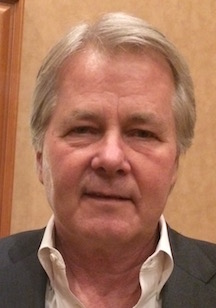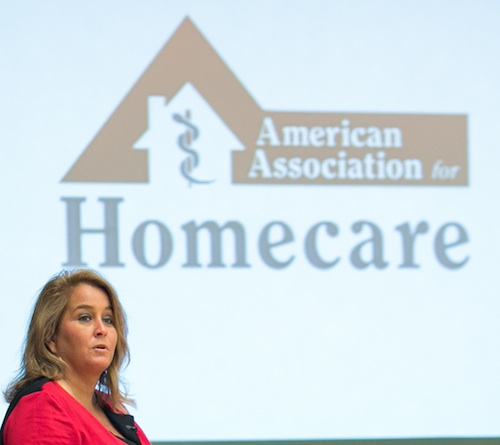SILVER SPRING, MD – Steve Ackerman (pictured), CEO of Spectrum Medical, Silver Spring, Maryland, took over as chairman of the American Association for Homecare Board of Directors at the recent AAHomecare legislative conference. As an advocacy veteran, Ackerman has seen the industry’s ups and downs up close. Medtrade Monday sat down with the new chairman to get his opinions on a variety of topics.
Greg Thompson, editor of Medtrade Monday: What is your level of optimism at this point?
Steve Ackerman, CEO, Spectrum Medical, Silver Spring, Maryland, and chairman of the Board of Directors, American Association for Homecare: I’m still very optimistic. My message to the industry right now is that we need to stop surviving and start thriving.
Thompson: Business models are changing in the HME industry. What are you seeing?
Ackerman: We’re moving away from the reimbursement model, at least in some of the core products. Now oxygen and some of the other ones are still very Medicare- and insurance-dependent, but I think we are seeing a lot of companies doing well in retail and home improvements, and the realization that aging in place is here to stay…There is optimism that there is business out there, but it’s going to be a different model than what we are used to.
Thompson: What was your impression of the recent AAHomecare Legislative Conference?
Ackerman: The conference was much more upbeat than it has been in the past few years. For the last five or six years, the conference has been very focused on getting up to the Hill and initiating legislation that was going to thwart or modify competitive bidding.
 This time around, everybody was feeling optimistic, and rightfully so, about the appointment of Tom Price as secretary of Health and Human Services. He and his team understand our industry. The message on the Hill this time around was that we need to send a letter of support about the changes we are looking for—letting them know that a lot of the changes we have been looking for with competitive bidding can be done a regulatory basis, as opposed to having to be legislated.
This time around, everybody was feeling optimistic, and rightfully so, about the appointment of Tom Price as secretary of Health and Human Services. He and his team understand our industry. The message on the Hill this time around was that we need to send a letter of support about the changes we are looking for—letting them know that a lot of the changes we have been looking for with competitive bidding can be done a regulatory basis, as opposed to having to be legislated.
We are starting to see fruit from those efforts already. We saw good participation with the House sign-on letter. Staff people at CMS are reportedly working on our issues in a way that I think will be positive for the industry.
Thompson: What do you say to providers who are on the fence about getting involved with advocacy?
Ackerman: We are all very busy people. Advocacy must be done as a collective group with a collective voice. Our problems and issues need to be brought in an intelligent and succinct way.
Organizations such as VGM have done a terrific job coordinating the industry at a grassroots level. That coordination, along with the superior leadership we have had in recent years at AAHomecare, has brought the fruit that we are bearing right now. To anyone who is standing on the sidelines, it is now time to step into the arena, and the logical way to do it is at the local level. Make sure you know your congressman and senator. They work for you.
 There is a wealth of information that Jay Witter, Kim Brummett, Laura Williard (pictured), and the rest of the team can give to you to present to your legislators. Now is a good time to do it. We are mainly going in to advise them, and ask for their support in a less threatening way. We need them to support the efforts of the secretary of HHS on some of these changes that are drastically needed.
There is a wealth of information that Jay Witter, Kim Brummett, Laura Williard (pictured), and the rest of the team can give to you to present to your legislators. Now is a good time to do it. We are mainly going in to advise them, and ask for their support in a less threatening way. We need them to support the efforts of the secretary of HHS on some of these changes that are drastically needed.
Thompson: What aspect of HME issues resonate with lawmakers?
Ackerman: Access is the biggest problem right now. There is still a belief at CMS, particularly from the career folks, that access is not an issue. We need to encourage discharge planners to phone in, write in, and e-mail their feelings about what is really going on from an access standpoint. Medicare is built on silos, and the money that they are saving in the HME arena is being cost-shifted to the Part A side of things because people are being hung up in the hospital and be re-admitted.
Thompson: What is next on the advocacy agenda?
Ackerman: A Senate sign-on letter is in the works. It would be a companion letter to go along with the House letter to really show the career folks at CMS that this [competitive bidding issues] is something that is seriously being monitored by Congress. OMB is getting copies of these letters.
Thompson: Why are face-to-face meeting like Medtrade (Oct 23-25, 2017, in Atlanta) still important in 2017?
Ackerman: Medtrade is a vitally important part of the HME industry. It gives you that re-energizing, tuned-in feeling that you need to have a couple times a year—so you realize you are not alone in this industry. I go there for a variety of reasons, and the main one is to pick up ideas and best practices, and make the contacts. I can call those contacts and solve a problem that has already been solved in a different part of the country. That’s the networking aspect. Being able to kick the tires with the manufacturers and polish your sales skills is also important. You can’t do that on the Internet. Putting a bit of money off to the side to make two trips a year to Medtrade Spring and Medtrade is worth it.

